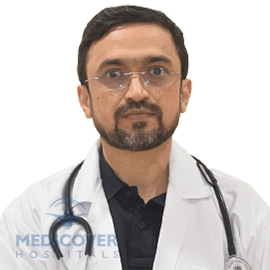Best Tetanus Treatment Specialists in Aurangabad
4 Specialist(s)
Tetanus is a severe infection caused by germs that need quick help from doctors. When it's about staying healthy, picking the right tetanus doctor is essential. In Aurangabad, we have brilliant and experienced tetanus doctors who are good at taking care of this problem. Let's discuss why you should choose Medicover Hospitals in Aurangabad for tetanus treatment and the excellent tools they use to ensure you're safe from this dangerous illness.
Why Choose Medicover Hospitals for Tetanus Treatment in Aurangabad:
- Specialized Knowledge: The doctors at Medicover Hospitals in Aurangabad know about Tetanus. They're experts who have been taking care of people with Tetanus for a long time. They use the newest ways to diagnose and treat this condition so you can get better quickly.
- Taking Care of You: In Medicover Hospitals, your health and happiness matter the most. The Best Tetanus Doctors in Aurangabad care about you and your family. They ensure you're not just physically okay but also feeling emotionally sound. They look at all the parts that make you healthy and happy, not just the sickness.
- Modern and Fancy Equipment: Our hospital is advanced and has all the incredible machines and tools. We have special rooms for seriously ill patients and high-tech operating rooms. This helps make your treatment smooth and quick.
- Collaborative Approach: Our tetanus experts work with others. They team up with other doctors specialising in infections, brain problems, and serious care. This helps them give you the best care that's just right for what you need. They all work together to ensure you get the best care possible.
Modern Diagnostic Methods of Tetanus:
- Neurological Assessment: Advanced neurological evaluations are conducted to assess the extent of tetanus infection, focusing on muscle rigidity, spasms, and any neurological complications.
- Laboratory Testing: Blood tests may be performed to detect the presence of the tetanus bacterium or its toxins, aiding in confirming the diagnosis.
- Imaging: In some cases, imaging studies like CT scans or MRI scans may be used to evaluate the condition of the central nervous system, especially if neurological symptoms are present.
- Electromyography (EMG): This diagnostic procedure measures electrical activity in muscles and nerves and can help assess the degree of muscle involvement in Tetanus.
- Clinical Observation: Clinical evaluation remains a critical component in diagnosing Tetanus. The characteristic symptoms of muscle stiffness, spasms, and "lockjaw" often lead to a clinical diagnosis, confirmed through laboratory tests.




